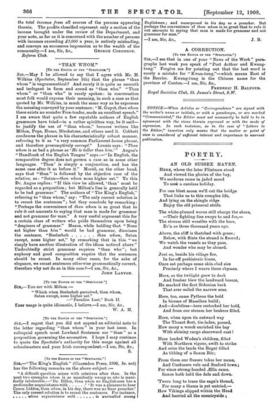"THAN WHOM."
[To THE EDITOR OF THE " SPECTATOR:] Sin,—May I be allowed to say that I agree with Mr. M. Wilkins (Spectator, September 5th) that the phrase "than whom" is ungrammatical P And surely it is quite as uncouth and inelegant in form and sound as "than who." "Than whom" or "than who" is rarely spoken: in conversation most folk would express their meaning, in such a case as that quoted by Mr. Wilkins, in much the same way as he expresses the meaning conveyed by your sentence: "l13. Guyot, than whom there exists no sounder Free-trader, made an excellent speech." I am aware that quite a few reputable authors of English grammars have tried—in a rather spiritless way, be it said— to justify the use of "than whom," because writers like Milton, Pope, Hume, Blackstone, and others used it. Cobbett condemns the phrase in his characteristically robust manner, referring to it as "a very common Parliament-house phrase, and therefore presumptively corrupt." Lennie says : "Than whom is as bad a phrase as He is taller than him.'" Angus's "Handbook of the English Tongue" says :—" In English, the comparative degree does not govern a case as in some other languages. Than' is simply - a conjunction, and has the , same case after it as before it." Morel, on the other hand, says that "than" is followed by the objective case of the relative, as : "Satan—than whom none higher sat." To this Dr. Angus replies: "If this view be allowed, than' must be regarded as .a preposition ; but Milton's line is generally held to be bad grammar." The authors of "The King's English," referring to "than whom," say: "The only correct solution is to recast the sentences "; but they conclude by remarking : ".Perhaps the convenience of than whom, is so great that to rule it out amounts to saying that man is made for grammar and not grammar for man." A very useful argument this for a certain class of writers who pride themselves upon being "despisers of grammar." Mason, while holding that "None sat higher than him" would be bad grammar, dismisses the sentence, "Beelzebub than whom, Satan except, none higher sat," by remarking that in this "we simply have another illustration of the idiom noticed above." Undoubtedly strict grammar requires "than who" ; but euphony and good composition require -that the sentences should be recast. In many other cases, for the sake of elegance, we recast sentences otherwise grammatically correct, therefore why not do so in this case P—I am, Sir, &c., Joint LANYON.










































 Previous page
Previous page